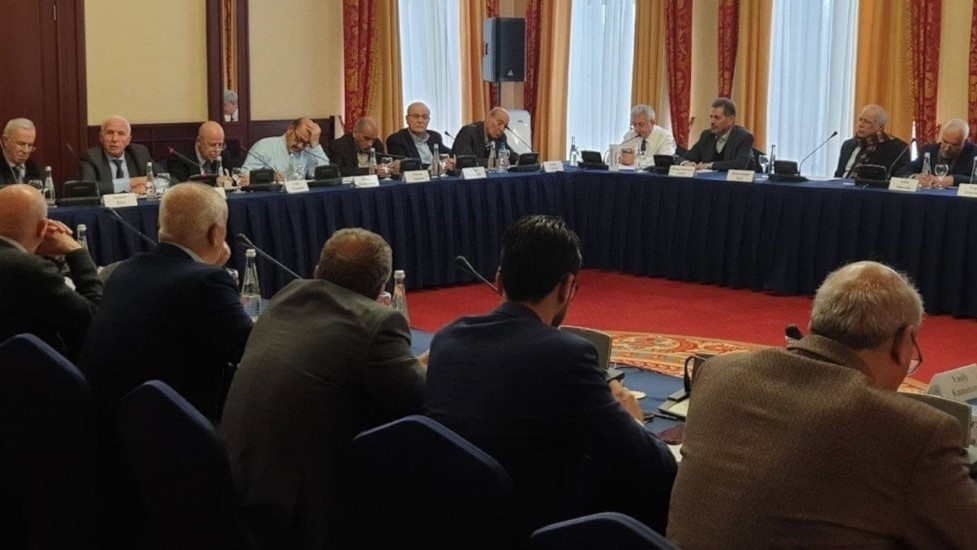Palestinian political groups have gathered in Moscow to discuss the possibilities of greater unity and the formation of a united government to work for the formation of an independent state and to resist the ongoing war in Gaza.
The meeting is being attended by all major groups in Palestine such as the constituents of the Palestinian Liberation Organization (PLO), including Fatah and Palestinian People’s Party, and non-constituents such as Hamas and Palestinian Islamic Jihad.
According to Russian Deputy Foreign Minister Mikhail Bogdanov, representatives of 14 Palestinian organizations, both from the occupied Palestinian territories as well from countries in the West Asian region, have been invited for the meeting.
The meeting commenced on Thursday and will go on until Saturday.
This is the fourth such meeting held in Moscow in the last couple of years. Similar rounds of talks had been held in several other countries in West Asia such as Turkey in the recent past as well. However, this is the first attempt to bring all the parties in Palestine together since the beginning of the Israeli war in October which has killed over 30,000 people and wounded over 70,000 other Palestinians.
Speaking to Al Mayadeen, member of political bureau of the Palestinian Islamic Jihad, Ihsan Ataya, stated that his organization is keen on reaching a common position with others to “preserve the rights and demands of Palestinian people” and has prioritized the end of Israeli aggression on Gaza over the tackling of factional differences.
The meeting becomes significant in the context that Israel has used the disagreements between Fatah and Hamas as an excuse to prevent talks for the creation of an independent Palestinian state in the territories occupied since 1967.
Talking about this fact during the inauguration of the meeting on Thursday, Sergei Lavrov, Russia’s Foreign Minister underlined that, “one of the pretexts for postponing and rescheduling” talks for peace in the region “is lack of unity within Palestinian ranks.”
Lavrov emphasized that Russia is just using its unique situation to facilitate the talks and it is up to Palestinians to decide how they want to put an united front and include people in the future unity government which will reflect “the interests of the entire Palestinian people.”
The Palestinian Authority (PA), which was formed in the middle of 1990s after the Oslo accords between PLO and Israel, had governed Gaza and some parts of occupied West Bank until 2006. In the popular elections for the PA in that year, Hamas had won the majority of seats but due to international pressure and factional differences, a division was created. As a result, the PA continued to administer parts of the occupied West Bank whereas Hamas took control of the administration in Gaza defying Israel’s refusal to recognize its electoral victory.
Hamas has maintained its control over the administration of the Gaza strip since 2006 despite crippling Israeli blockade and repeated wars.
Both the US and Israel have declared Hamas as a terrorist organization and refused to identify it as a legitimate representative of Palestinian people. It is not clear what will be their reactions to a unity government in occupied Palestine with Hamas representatives in it.
While the US has repeatedly talked about a revamped PA governing both the West Bank and Gaza since the beginning of the war, Israel has denied any role for the PA in the governance of Gaza after the war.
Nevertheless, since the present PA government led by prime minister Mohammad Shattayeh resigned last week and there is a growing need for a united response to the occupation and war in Gaza, the meeting is expected to start a process of Palestinian unity, Mustafa Barghouti head of the Palestinian National Initiative, one of the groups participating in the talks, told Al-Jazeera.
Maher al-Taher, head of international relations of the Popular Front for the Liberation of Palestine (PFLP), told Al-Mayadeen that the atmosphere of talks in Moscow was much more congenial than similar talks in the past.
Taher also underlined that there is a greater recognition of the fact that the current situation in the PLO must not continue and representatives from Hamas and Islamic Jihad must be included in it.





